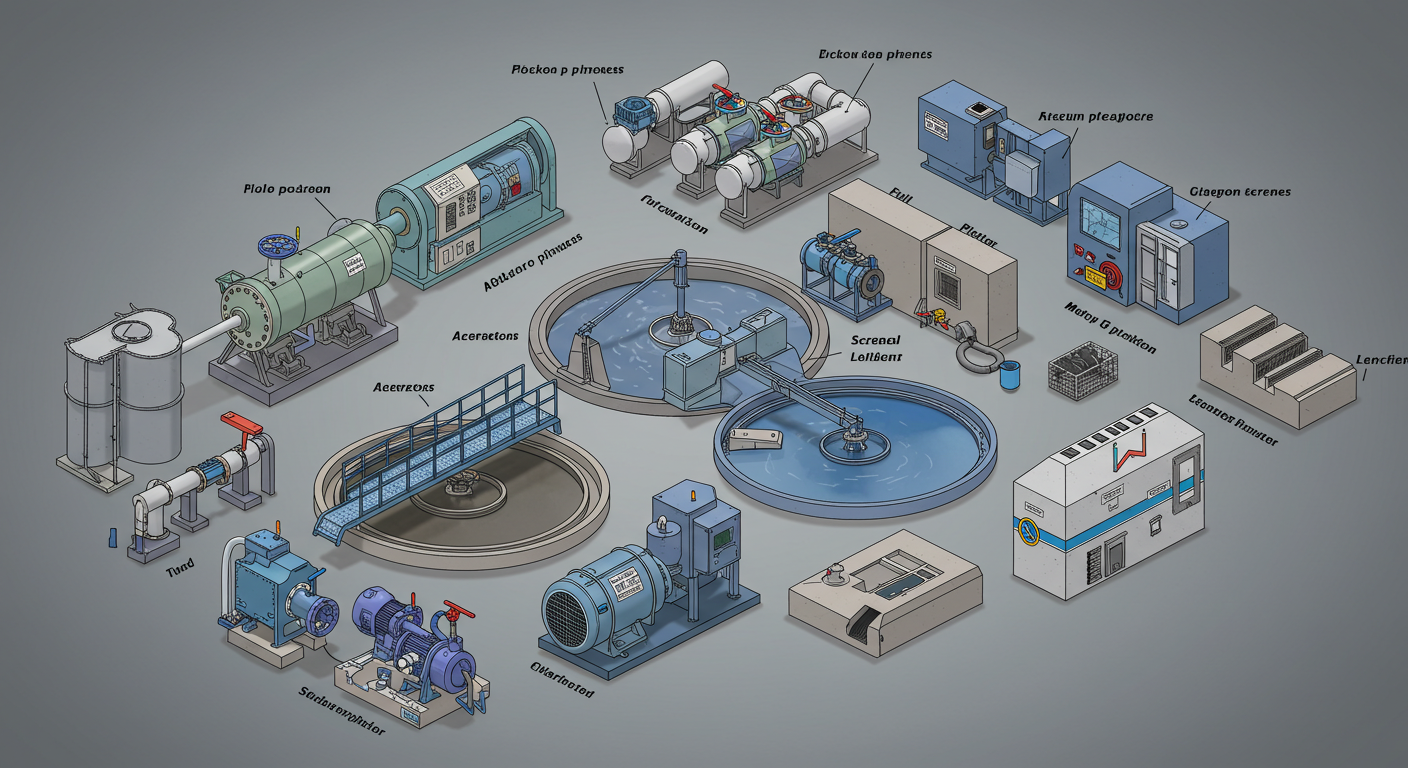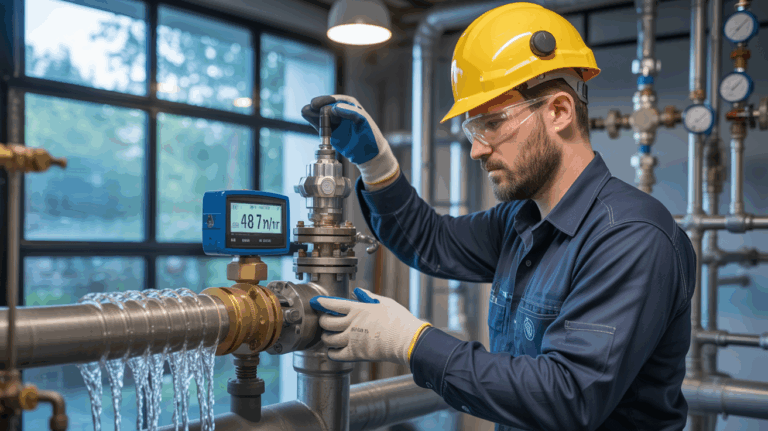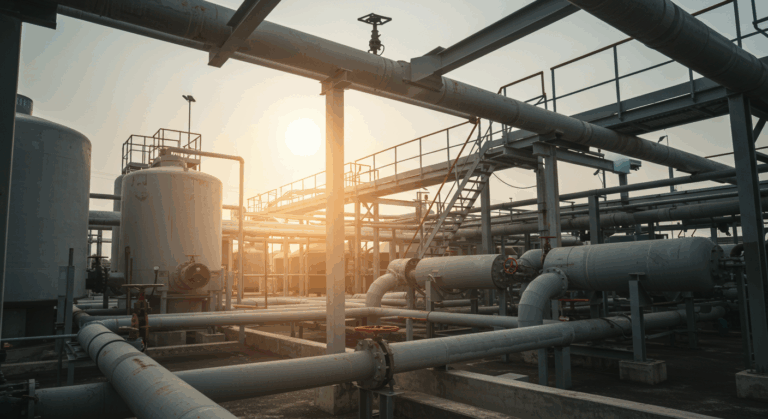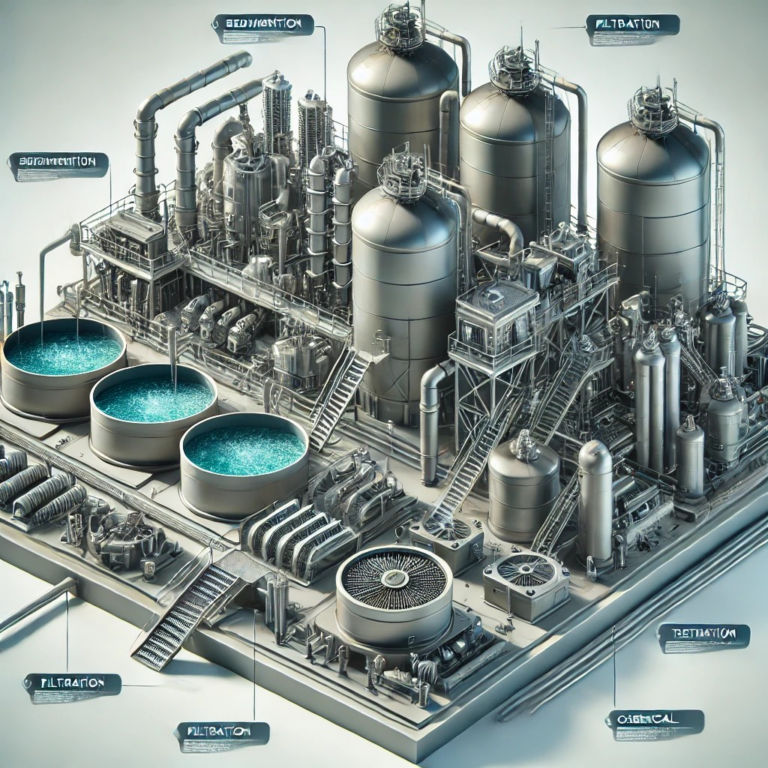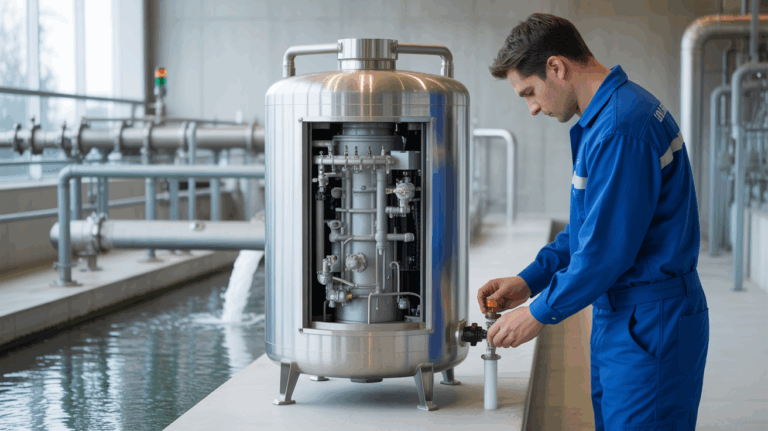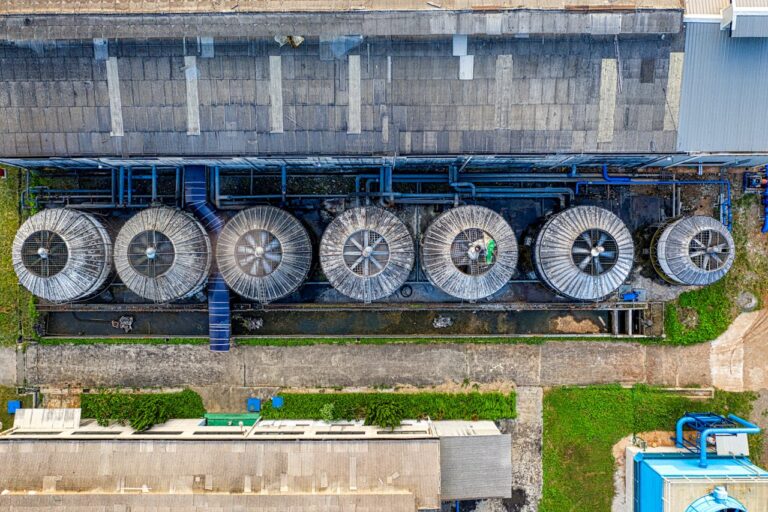Wastewater Parts for Sale
Effective wastewater management is crucial for both environmental and public health, addressing the challenges posed by both domestic and industrial wastewater. The process typically involves multiple stages, starting with primary wastewater treatment that removes large solids, followed by secondary wastewater treatment where biological processes help degrade remaining contaminants. This comprehensive approach ensures that treated wastewater meets regulatory standards before it is released into ecosystems or reused. Wastewater treatment plants rely on various components to function efficiently, and the availability of quality Wastewater Parts for Sale is essential for the maintenance and upgrading of these systems. Investing in reliable parts contributes to the overall effectiveness of wastewater treatment systems, ultimately enhancing the quality of treated wastewater.
- Regular maintenance of wastewater parts is vital to prevent system failures.
- Quality components can improve the efficiency of wastewater treatment processes.
- Upgrading old parts can lead to significant energy savings in treatment plants.
- Proper installation of wastewater parts ensures compliance with environmental regulations.
- Availability of parts influences the speed of repairs and maintenance schedules.
- Choosing reputable manufacturers for wastewater parts can enhance system longevity.
- Training staff on the proper use of wastewater components can maximize operational efficiency.
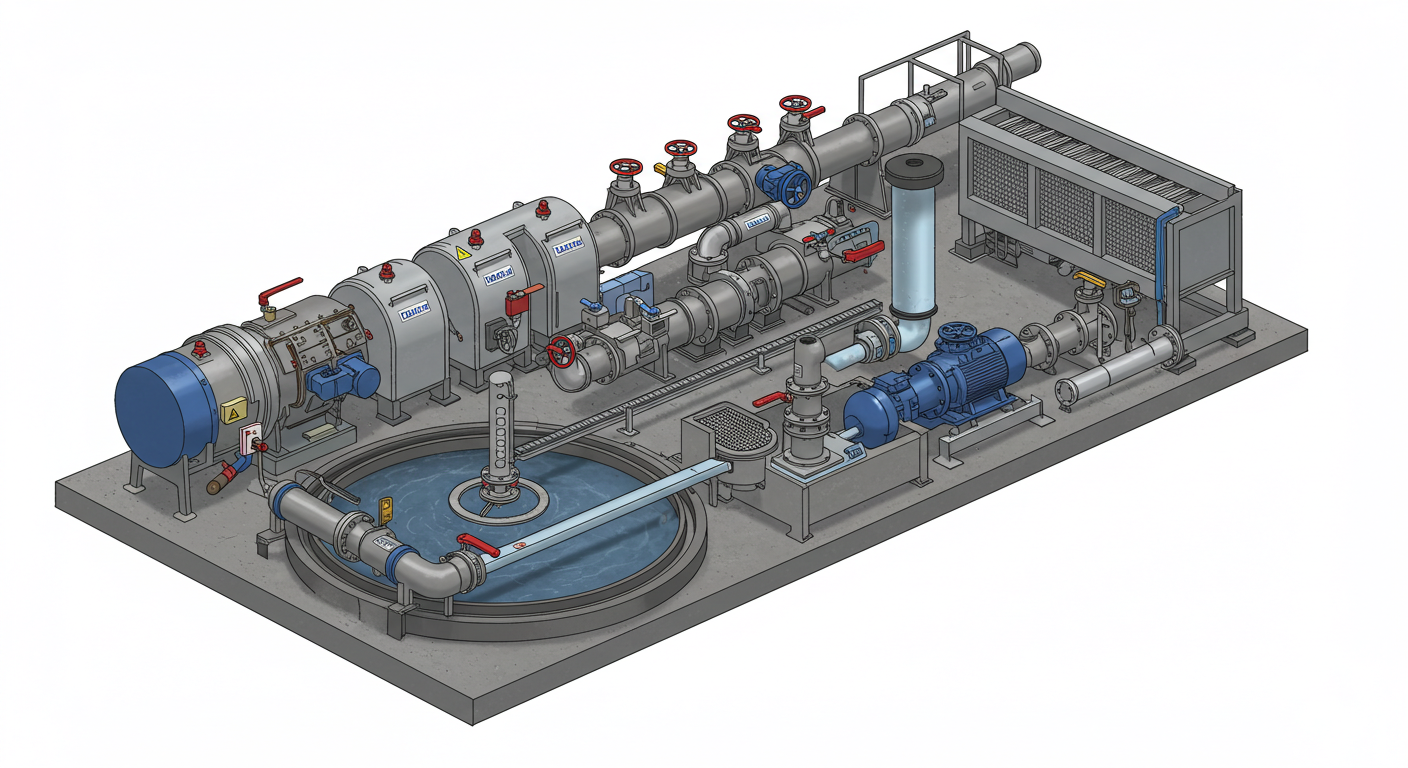
Wastewater Parts for Sale | Importance of Effective Wastewater Treatment
Effective wastewater treatment is crucial for maintaining environmental health and ensuring public safety. It involves the removal of contaminants from industrial wastewater and municipal sewage before they enter landfills, sewers, or natural bodies of water. Tertiary wastewater treatment plays a significant role in this process by further purifying water, making it suitable for water recycling and other beneficial uses. Utilizing quality wastewater parts for sale ensures that these systems operate efficiently and can handle the diverse range of wastes produced by industries.
The importance of proper wastewater management extends beyond just treatment. It also encompasses the integration of advanced technologies and equipment designed for water purification and industrial water treatment. High-quality parts washers and other essential components are vital for the seamless operation of waste water treatment facilities. By investing in effective solutions, municipalities and industries can better manage their industrial waste while contributing to a sustainable future for water resources.
Key Components of Wastewater Treatment Systems
Effective wastewater treatment systems rely on several key components to ensure the efficient removal of contaminants from water. These systems often handle various types of waste, including landfill leachate and hazardous waste. Critical elements typically include washers for solid removal, adsorption units for chemical processes, and treatment tanks to facilitate the breakdown of organic matter. By addressing these components, wastewater systems can recycle large volumes of water, processing thousands of gallons daily while maintaining the desired water quality standards.
Another important aspect of wastewater treatment is the management of sewer systems. A well-designed wastewater treatment facility must adequately treat all incoming waste to prevent environmental contamination. Components may include aeration chambers and clarifiers to support effective biological treatment. The integration of modern technologies can enhance the removal of pollutants and improve overall efficiency, ultimately leading to reduced water vapor and more effective recycling of treated water back into the ecosystem. Wastewater Parts of Sale play a crucial role in maintaining these systems by providing reliable replacements and upgrades to essential components.
Types of Wastewater Treatment Systems
Wastewater treatment systems encompass a variety of methods designed to purify water before it re-enters natural ecosystems or is reused for purposes such as irrigation systems and drinking water. Essential components include tanks for sedimentation, dissolved air flotation systems, and water filters that remove impurities effectively. The integration of chemicals, such as coagulants, enhances the waste treatment process, while carbon adsorption plays a critical role in filtering out organic compounds. Sourcing quality Wastewater Parts of Sale, like specialized plumbing fixtures and advanced water treatment tools, ensures the efficiency and longevity of these systems. A well-stocked warehouse of wastewater parts can facilitate rapid repairs and upgrades, optimizing the overall functionality of treatment operations.
Conventional Wastewater Treatment Methods
Effective management of wastewater often relies on conventional treatment methods. These methods typically involve several stages, such as screening, sedimentation, and biological treatment. Industrial plants utilize tanks designed to handle various types of wastewater, ensuring robust wastewater analysis for compliance and efficiency. The availability of wastewater parts of sale allows facilities to easily source necessary wastewater supplies, enhancing their ability to treat wastewater effectively.
A significant focus in the wastewater treatment industry remains on optimizing domestic wastewater disposal through established techniques. These conventional processes can be supplemented with custom wastewater treatment solutions tailored to specific needs. Utilizing quality wastewater treatment equipment helps streamline operations while maximizing treatment efficiency. Reliable wastewater parts of sale play a vital role in maintaining these systems and ensuring high performance in managing wastewater.
Advanced Industrial Wastewater Treatment Technologies
Innovative solutions in wastewater treatment have become crucial for industries facing stringent regulations. Advanced technologies for industrial wastewater pretreatment are essential in managing industrial wastewater contaminants before they enter the main treatment system. Effective wastewater management systems incorporate various methods, including chemical wastewater treatment, which can effectively neutralize hazardous substances. This leads to better maintenance of wastewater treatment assets and ensures compliance with environmental standards. Operational wastewater pre-treatment not only mitigates the risk of contamination but also optimizes the performance of facilities handling domestic wastewater flows.
The trend toward closed-loop wastewater systems is gaining momentum, allowing for the recycling of water-based wastes. Such systems can enhance efficiency, reducing the volume of leachate wastewater treatment required while simultaneously decreasing costs associated with wastewater disposal. Cost-effective wastewater management strategies often leverage advanced technologies like mphr wastewater treatment, which ensures a streamlined process for industrial operations. Sourcing reliable Wastewater Parts of Sale helps industries maintain these systems, ensuring that they continue to meet the evolving demands of wastewater treatment.
| Technology | Type | Key Benefits |
|---|---|---|
| Chemical Pre-treatment | Chemical | Neutralizes hazardous substances; enhances compliance with regulations |
| Closed-loop Systems | Recycling | Reduces wastewater volume; lowers disposal costs |
| MPHR Treatment | Mechanical | Streamlines industrial wastewater processing; increases operational efficiency |
| Biological Treatment | Biological | Effective in breaking down organic materials; reduces BOD levels |
Wastewater Parts for Sale
A robust selection of Wastewater Parts of Sale is crucial for maintaining efficient wastewater treatment systems. Effective industrial water management relies on various components, including industrial parts washers and sludge digestion equipment. These parts ensure proper process water purification and facilitate essential tasks such as tank washing and sludge removal. Advanced water recycling/reuse technology plays a significant role in optimizing resource use, especially in applications involving produced water treatment. Investing in quality equipment is vital for effective water analysis and ensuring a seamless water process. The market for turnkey wastewater treatment solutions continues to expand, underscoring the importance of sourcing reliable wastewater parts that meet industry demands.
- High-quality pumps for efficient fluid transfer
- Durable valves to maintain system integrity
- Filtration systems for effective solid removal
- Monitoring equipment for real-time water quality analysis
- Aeration tools to enhance biological treatment processes
- Repair kits for quick maintenance and downtime reduction
- Compatible connectors and fittings for easy installation
Common Aftermarket Parts for Wastewater Systems
The market for Wastewater Parts of Sale includes a wide variety of components tailored to optimize wastewater systems. Essential parts such as water quality analyzers ensure that the effluent meets regulatory standards before being discharged. Custom water solutions play a vital role in cleaning and washing processes in production facilities, facilitating effective wash water recovery. Investing in reliable aftermarket parts can significantly enhance the efficiency of hazardous waste treatment and biological water treatment applications.
Aftermarket parts are critical for maintaining the functionality of a drinking water system. Components like pumps, filters, and valves allow for proper dump and wash operations, ensuring each facility can handle varying workloads, often measured in gallons. Choosing high-quality aftermarket components can lead to reduced downtime and improved overall system performance. Maintaining these systems not only preserves water quality but also supports sustainable practices in industrial settings, contributing to a cleaner environment.
Sourcing Quality Wastewater Treatment Equipment
Finding reliable wastewater treatment equipment is crucial for businesses in various industries, including beverage, chemical, and manufacturing. Quality components such as carbon adsorption systems, nutrient removal units, and clay-based water treatment solutions are vital for effective operation. A range of Wastewater Parts of Sale includes tanks specifically designed for oil water separation and systems optimized for recycling and reuse. Efficient handling of slurry mixtures and providing semi-automatic wash functions can enhance the overall performance of environmental systems.
Understanding the specific needs of your wastewater treatment process will guide the selection of appropriate equipment. It is essential to choose products that not only serve their purpose effectively but also ensure compliance with environmental regulations. Equipment sourcing should focus on proven technologies that increase efficiency and reliability. By prioritizing quality, businesses can achieve optimal results in managing wastewater, thereby supporting better operational practices and environmental stewardship.
Wastewater Management Systems
Efficient management of wastewater is crucial for various sectors, including biogas industries and gas industries, as it influences water quality in local waterways. Technologies like hydro-kinetic systems aid in meeting water discharge requirements while ensuring that harmful substances, such as metals and chlorine dioxide chemicals, are effectively treated. Rinse water treatment processes often utilize mechanical water filters and water filter media to enhance the removal of impurities. Compliance with standards, such as ASME code tanks, is essential for maintaining safety and performance in wastewater treatment systems. The availability of Wastewater Parts of Sale, including components for irrigation and specialized filtration systems, supports operators in implementing effective wastewater management solutions.
Integration of Technology in Wastewater Management
The integration of technology significantly enhances the efficiency of wastewater management across various sectors. Over time, advanced processes have emerged to ensure that wastewater parts of sale are utilized effectively, especially in areas like chemical processing and residential industries. Automated systems are now capable of managing storage and removal processes with precision, ensuring that sludge is separated efficiently and that wastewater is treated to a clean standard. Local water boards often rely on these technologies to maintain compliance and protect water quality.
Innovative solutions such as self-cleaning filtration systems and random dump plastics are gaining traction in modern wastewater treatment facilities. These components streamline operations and reduce the need for manual maintenance, which can be time-consuming and costly. Distributors of wastewater parts of sale have responded to this demand by offering a wide variety of equipment that supports these advanced technologies. By implementing such systems, businesses can improve production efficiency and enhance environmental sustainability.
Benefits of Efficient Wastewater Management Solutions
Efficient wastewater management solutions offer significant advantages across various industries. Implementing effective treatment systems can greatly enhance the quality of liquid discharge, making it suitable for commercial applications like pond aeration and drip irrigation systems. Utilizing the right wastewater parts of sale helps streamline processes such as grease removal and heavy metals removal, ensuring compliance with environmental regulations. Maintenance products play a crucial role in extending the lifespan of equipment, contributing to cost savings over time.
Such solutions also encompass the use of specialized chemicals to optimize treatment processes. Industries benefit from tailored mixtures that can address specific challenges, including the cleaning of dye penetrants and other contaminants. By investing in high-quality wastewater parts of sale, organizations can enhance the efficiency of their systems, reducing operational costs and improving overall environmental impact. An effective approach to wastewater treatment not only meets regulatory standards but also supports sustainable practices across various sectors.
The Wastewater Treatment Industry
The wastewater treatment industry is increasingly focused on advancements in the purification process, delivering high-quality products to tackle the challenges posed by untreated water. Effective treatment requires various products, including pump tanks and gas scrubber packing, which play critical roles in ensuring a smooth operation. Manufactured parts must meet stringent quality standards to support applications in sealant manufacturing industries and ceramic slurry treatment. Wastewater Parts of Sale offer essential components that enhance the efficiency and reliability of treatment systems. By prioritizing the quality of these products, the industry can better manage wastewater, ensuring a sustainable future through effective separation and processing techniques.
| Component | Function | Applications |
|---|---|---|
| Pump Tanks | Store and transport wastewater | Municipal wastewater treatment, industrial processes |
| Gas Scrubber Packing | Remove pollutants and prevent gas emissions | Air quality control, chemical processing |
| Sealants | Prevent leaks and protect against corrosion | Sealant manufacturing, water containment systems |
| Ceramic Slurry Treatment Equipment | Facilitate the separation of solid and liquid phases | Ceramic manufacturing, wastewater processing |
Current Trends and Innovations in Wastewater Treatment
The wastewater treatment industry is experiencing a surge in innovative products designed to enhance the efficiency and effectiveness of systems. Manufacturers are now offering a variety of wastewater parts for sale, including advanced filters and concentrators. These products aim to improve the treatment process while ensuring a sanitary home environment. Chemical treatment programs have become more sophisticated, allowing for tailored solutions that meet specific treatment needs. The availability of quality septic tank parts contributes to streamlined operations and better overall performance.
The shift towards sustainability is evident in the latest trends, with many companies focusing on eco-friendly solutions. Wastewater management systems now utilize cutting-edge filter media that not only maximize efficiency but also minimize environmental impact. Suppliers are increasingly prioritizing the development of parts that support reduced operational costs while generating better revenue streams for businesses. As the demand for reliable wastewater parts of sale grows, innovation in treatment technologies is essential for maintaining a competitive edge in the industry.
Conclusion
Effective wastewater treatment plays a pivotal role in enhancing environmental health and ensuring public safety. The availability of high-quality Wastewater Parts for Sale is essential for maintaining optimal system performance across various applications, from municipal treatment facilities to industrial plants. Investing in reliable wastewater parts not only boosts efficiency but also minimizes downtime and operational costs. As the demand for advanced solutions continues to grow, sourcing quality components becomes increasingly crucial for wastewater management professionals aiming to implement sustainable practices.
FAQS
What are some examples of wastewater aftermarket parts used in beverage industries?
Wastewater aftermarket parts are essential for biological wastewater treatment, ensuring that the untreated water passes through systems effectively. In production facilities, these parts are crucial for managing closed loop wastewater where products work in synergy to separate sludge and solids. High quality products, such as wastewater treatment supplies, help maintain optimal performance in various applications, serving chemical processes efficiently in beverage industries.
How does the wastewater portion in a production facility serve chemical processes and manage solids at MSRP for various applications like pots?
The water portion in wastewater management within a production facility plays a crucial role as it serves chemical processes that are essential for operational efficiency. It is designed to eliminate solids and manage them effectively, ensuring the process meets the manufacturer’s suggested retail price (MSRP) for various applications, including those involving pots.
How can the management of wastewater solids impact the overall efficiency of production facilities?
Effective management of wastewater solids is crucial for enhancing the efficiency of production facilities. Implementing robust processes that handle solids appropriately can lead to significant improvements in operations, potentially aligning with market rates or MSRP for various industrial applications.
How can industries effectively manage wastewater solids while ensuring compliance with MSRP regulations?
Effective management of wastewater solids is crucial for industries to optimize their processes and remain compliant with MSRP regulations. By implementing advanced treatment technologies and establishing robust protocols, facilities can significantly reduce solids in wastewater, enhancing overall efficiency and sustainability.
How do solids influence the pricing strategy for wastewater parts in the context of MSRP?
The presence of solids in wastewater can significantly influence the pricing strategy for wastewater parts due to the complexity of managing these solids within the treatment process. Ensuring compliance with MSRP can lead to higher costs for parts that effectively handle the removal and processing of solids, impacting the overall pricing in the market.
How do industry standards for wastewater management affect the pricing of solids under MSRP regulations?
Industry standards for wastewater management play a significant role in determining the pricing strategy for solids in wastewater treatment processes. When companies adhere to MSRP regulations, they must consider the costs associated with managing solids effectively, which can influence the overall pricing of wastewater parts. By optimizing the management of solids, industries can potentially reduce costs and improve their compliance with MSRP standards.
How do different industries strategize the use of wastewater solids while adhering to MSRP guidelines?
Industries must carefully strategize the management of wastewater solids to optimize their processes and ensure compliance with MSRP regulations. The efficient handling of these solids can significantly influence the overall production costs and potentially improve the pricing structure under MSRP requirements.
How do different industrial sectors approach the pricing of wastewater parts while considering solids and MSRP regulations?
Various industrial sectors strategically price wastewater parts by taking into account the role of solids in their processes and adhering to MSRP regulations. The management of these solids can significantly impact the overall cost and compliance of wastewater treatment systems, ultimately influencing their pricing strategies under MSRP.
What strategies can industries implement to optimize the handling of solids in wastewater management while adhering to MSRP regulations?
Industries can optimize the handling of solids in wastewater management by employing technologies that minimize solid waste production and enhance treatment processes, ensuring compliance with MSRP regulations. This involves regular monitoring of solids concentration and implementing best practices to maintain efficiency while meeting MSRP standards.
What are the potential consequences of improperly managing solids in wastewater systems concerning MSRP compliance?
Improper management of solids in wastewater systems can lead to significant regulatory penalties under MSRP compliance, negatively affecting operational efficiency and environmental sustainability. Industries must ensure that solids are adequately treated and disposed of to meet the standards set forth by MSRP regulations, thereby avoiding fines and maintaining smooth operations.

